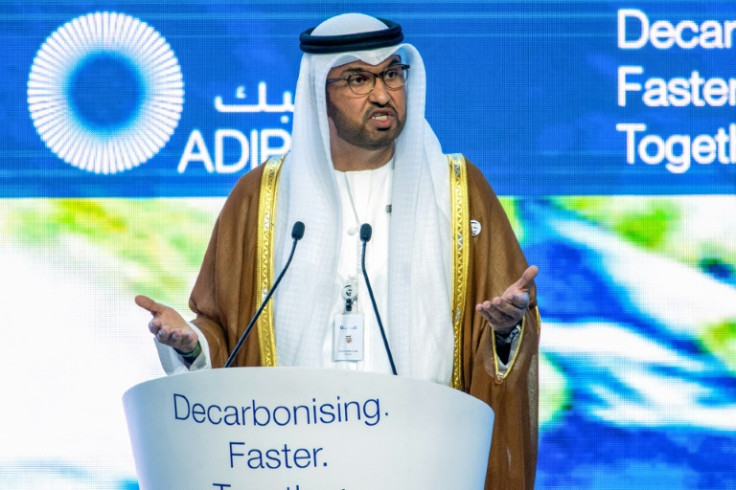Oil Industry 'Central' To Climate Solutions: COP28 Head
The president of the upcoming COP28 climate talks told an Abu Dhabi oil conference on Monday that the fossil fuel industry would play an essential role in addressing the climate crisis.

The president of the upcoming COP28 climate talks told an Abu Dhabi oil conference on Monday that the fossil fuel industry would play an essential role in addressing the climate crisis.
"For too long, this industry has been viewed as part of the problem, that it's not doing enough and in some cases even blocking progress," said Sultan Al Jaber, the president-designate of the COP28 talks, who is also the head of UAE state-owned oil firm ADNOC.
"This is your opportunity to show the world that, in fact, you are central to the solution," he told the ADIPEC conference of global industry figures and government officials.
"This industry can change the global debate... It is time to silence the sceptics by applying scale, capital and technology to deliver outcomes."
Jaber urged industry leaders to curb emissions associated with energy production and expand use of renewable energy sources.
He also encouraged them to embrace "low carbon solutions" like carbon capture and storage, tools that climate experts say distract from the urgent goal of slashing fossil fuel pollution.
Climate activists have criticised the appointment of Jaber to lead the COP28 talks which take place in Dubai from November 30-December 12.
But Jaber has garnered the support of COP parties including US climate envoy John Kerry, partly by emphasising his belief that "the phase-down of fossil fuels is inevitable" -- a message he repeated on Monday.
At the same time top oil executives and officials from major oil-producing countries have advocated ramped-up investment to meet demand and stave off energy shortages.
Haitham Al-Ghais, secretary general of the Organization of the Petroleum Exporting Countries (OPEC), told the conference that calls to cease fossil fuel investments were dangerous.
"We see calls to stop investing in oil. We believe this is counterproductive," he said.
"This puts countries... from Europe and many other parts of the world at risk, because the cornerstone of global economic prosperity today is energy security."
Instead, he called for investments of $600 billion per year between now and 2045 "just for the oil industry".
He added: "This is what it requires to be able to achieve energy security for Europe, for the rest of the world."
The oil company heads in Abu Dhabi underlined the dependence of the economy on fossil fuels, and the rise in prices which, according to them, was induced by a drop in investments in the sector over the past few years.
TotalEnergies will pursue its projects in oil and gas, with a predicted growth rate of two to three percent per year, while investing $40 billion in energy transition and decarbonisation projects, said its CEO Patrick Pouyanne.
The CEO of Shell, Wael Sawan, said there would be a package of $10 billion to $15 billion over the next three years for low-carbon solutions.
COP28 is "a unique opportunity" to come to the table, he said, calling for concrete commitments around methane emissions.
The energy sector is a major contributor to human-initiated methane emissions which are responsible for around 30 percent of the rise in global temperatures since the Industrial Revolution, according to the International Energy Agency.
For Amanda Leland, executive director of the Environmental Defense Fund, the first COP to be run by the head of a petroleum company could move forward negotiations on methane and decarbonising the industry.
"We need to see where it goes," she said.
© Copyright AFP 2025. All rights reserved.





















